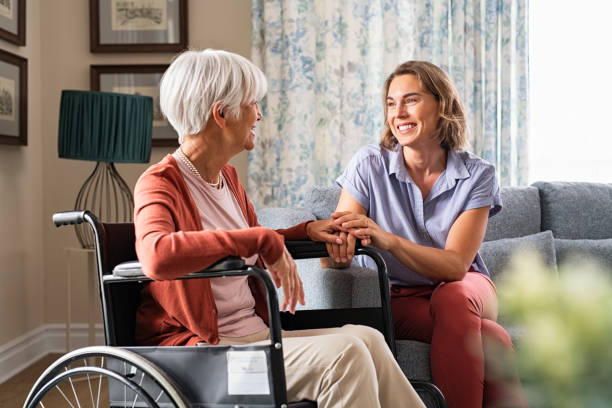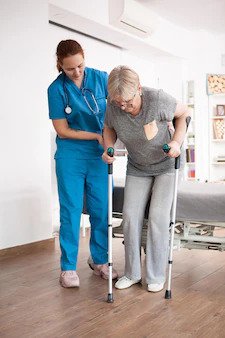As our loved ones age, their health needs may become more complex, requiring specialized care to enhance their quality of life. Palliative care, a comprehensive approach to managing the physical, emotional, and spiritual needs of seniors with serious illnesses, is an essential consideration. In this blog post, we will delve into the world of palliative care for seniors, exploring its benefits, key considerations, and how to make the right decision for your loved ones.
What is palliative care for seniors?
Palliative care for seniors is a form of care and support designed to help seniors suffering from chronic or terminal illnesses. Modern medicine has come a long way in treating these conditions, but it cannot always cure them completely. In these cases, palliative care can be given to improve your senior loved one’s quality of life and comfort by managing their symptoms and pain. It is an integral part of their comprehensive treatment plan and should be considered alongside other forms of therapy like curative therapies, rehabilitation, or hospice care.
Proponents contend that palliative care is beneficial because it focuses on providing comfort, including physical, emotional, and spiritual support, to the patient and their family. It allows for a more holistic approach to patient care since it addresses every aspect of living with a serious illness. Palliative care also offers specialized support by empowering seniors and their loved ones through education and resources to make informed decisions about their treatment options.
On the other hand, detractors argue that it may take away opportunities for more aggressive treatments as the focus leans toward providing relief from symptoms rather than attempting to cure the underlying medical condition. The decision about whether to incorporate palliative care or not requires careful consideration and consultation with all involved parties. Before making such a big decision, it’s important to understand both sides of the argument so you can feel confident you’re making the best choice for your senior loved one.
The benefits of palliative care
When considering care options for a senior loved one, palliative care is often a worthwhile option to consider. Palliative care offers many unique benefits, both in terms of improving quality of life and managing pain. In fact, research has shown that receiving proper palliative care can create a number of measurable improvements for seniors affected by serious illnesses or chronic conditions.
Physical Benefits
The primary purpose of palliative care is to help ease physical discomfort, which can come with a major medical diagnosis. As such, palliative care includes any treatments or medications that relieve physical pain while improving the quality of life for the patient. With multidisciplinary teams of caregivers, medical professionals, and physicians, palliative care staff can provide comfort and stability while creating an environment for optimal healing. Additionally, research has indicated that using various aspects of palliative care often leads to better symptom relief than traditional medical techniques alone.
Psychological and emotional benefits
Regardless of the patient’s age or condition, proper palliative care includes measures to improve mental as well as physical health. From counseling to support groups to other holistic approaches like aromatherapy or meditation, integrating strategies from different fields allows for a comprehensive treatment plan tailored just for the individual’s needs. By addressing emotional concerns early on in the process, patients have improved access to managing their symptoms by understanding them rather than simply being told how to medically handle them.
Social Benefits
In addition to offering invaluable support for seniors and their families during difficult times, one of the greatest benefits provided by palliative care is social interaction. Caring about each individual beyond simply addressing his or her medical needs creates a supportive environment where seniors feel empowered and respected while finding new ways to connect with those around them. Supportive relationships play an integral role in helping seniors maintain strong levels of independence as they navigate life-limiting illnesses.
Overall, choosing the right care option for a senior is never easy, yet there are many advantages associated with selecting an appropriate form of palliative care. While it might come too late for some patients and families, proper planning and proactive research enable increased understanding of all available options so that you can determine what best suits your situation now and in the future.
Understanding Comfort Care
When it comes to caring for elderly patients, palliative care is an increasingly popular topic. Comfort care, which is a type of palliative care, is also gaining attention. It’s important to understand what comfort care involves in order to make the right decisions for the senior loved one in your life.
Comfort care is a kind of specialized medical treatment provided to a patient who is terminally ill and has a very limited life expectancy. The goal of comfort care is to reduce pain and suffering while providing emotional support for the patient and their loved ones. Comfort care includes medications, therapies, nutrition, and hydration support, as well as spiritual guidance and social services such as hospice or home health care. It goes beyond providing physical relief and offers an array of services aimed at making the patient more comfortable during the final stages of life.
On the one hand, many people argue that comfort care should be considered an important and necessary part of end-of-life care for seniors. They maintain that its main objective is to reduce suffering, increase quality of life, and provide cultural and religious rituals to enable dying with dignity. On the other hand, some might view comfort care as unattractive due to its association with dying; they argue that pursuing treatment that does not cure or delay death may be seen as giving up hope too soon or having low expectations for longer survival.
Regardless of personal beliefs about comfort care, it plays an important role in providing quality end-of-life care for seniors. Understanding this option can help families make informed decisions when deciding on palliative treatments for their elderly relatives.
How does palliative care help seniors?
Palliative care is a type of healthcare that focuses on providing relief from the symptoms and stress of serious illnesses. The main goal of palliative care is to improve the quality of life for seniors by controlling pain and other distressing symptoms. It also provides emotional support to family members, helping them cope with their loved one’s illness.
By optimizing comfort levels and offering personalized attention and compassionate care, palliative care has numerous benefits for seniors. It allows elderly individuals to maintain control over their health decisions, which enables them to remain autonomous during treatment decisions. Palliative care can also provide physical, psychological, spiritual, and social support tailored to the individual’s needs, allowing for a more holistic approach to illness management.
In addition, studies have shown that palliative care can be an effective tool for improving both physical and mental health before, during, and after hospitalization or medical procedures. By addressing all facets of a person’s health—including physical, psychological, spiritual, and social—palliative care helps seniors manage the complex aspects of serious illness more effectively. And by supporting autonomy and choice throughout the course of treatment, it can help seniors feel empowered about their health journey and reduce any sense of helplessness or loss of control associated with illness-related treatments or decisions.
While there are many advantages to utilizing palliative care services for seniors, some critics argue that it may delay timely interventions by suggesting only symptom-relieving therapies instead of life-saving treatments. Ultimately, however, when it comes to making decisions about your elderly loved one’s health care needs, it’s important for you to evaluate what kind of support will best serve the individual’s goals.
Ultimately, palliative care can help seniors live as comfortably as possible while managing difficult illnesses and end-of-life transitions—all with a personalized touch that addresses each individual’s unique needs. With this in mind, it’s clear that palliative care offers numerous benefits for elderly individuals who need assistance navigating through their difficult medical journeys.
Physiological Benefits
When making the important decision to seek out palliative care for a senior loved one, many people think about potential physiological benefits before anything else. Studies show that relieving physical symptoms and increasing comfort can help seniors live their lives with more ease and less strain on their bodies. Palliative care seeks to improve a patient’s quality of life and minimize physical pain or discomfort associated with age-related health conditions. Common treatments involve prescribing medication, making adjustments to diet or lifestyle behaviors, offering physical therapy, and providing customized exercise regimens.
Opponents of the use of palliative care services often have concerns about administering potentially dangerous medications to older patients that may negatively affect them in other ways. Even with the best intentions, it remains true that some medications can be ill-fitting for certain individuals whose health is already compromised. In addition, they may not always feel comfortable discussing common issues like incontinence or mental decline, a subject that palliative care providers cover as part of their service.
That said, there are still considerable potential benefits associated with physiologically targeted palliative care. It is estimated that up to 70% of cases involving seniors receive at least some relief from symptoms through this type of treatment. Moreover, if patients find themselves in an uncomfortable or even agonizing place physically or mentally due to an age-related health condition, then the chance of finding a sense of solace is worth serious consideration.
Psychosocial Benefits
The psychosocial benefits of palliative care for seniors are becoming increasingly recognized. Palliative care provides emotional support to those in hospice as well as their families, helping them cope with any changes and accept the reality of their situation. As medical advancements have increased senior life expectancy, more people are living with chronic illnesses and progressive conditions that may require extensive caregiving needs. Palliative care can offer special guidance and support throughout this process, helping seniors maintain their quality of life despite living longer with chronic illness.
On the other hand, some oppose the implementation of palliative care services due to concerns that it will limit quality of life or encourage a fatalistic attitude towards poor health outcomes. However, palliative care is not intended to end life prematurely; rather, its goal is to improve the overall experience for someone facing a chronic or terminal illness. By providing physical, spiritual, and psychosocial comfort during this difficult time, many seniors can still live full lives despite their illness or condition.
Types of Palliative Care Providers
Palliative care providers come from different backgrounds, such as health professionals, home health aides, and social workers. All are specially trained to provide a variety of comfort-focused medical treatments and services for seniors.
Health Professionals: Health professionals include doctors, nurses, and physician assistants who specialize in palliative care. They work with a care team to develop and manage the patient’s treatment plan, focusing on their quality of life and comfort rather than curing their illness or disease. Depending on the patient’s needs, they may also involve specialists focusing on symptom management, including pain management, nutritional counseling, and spiritual support.
Home Health Aides: Home health aides provide personal care services to patients still living at home, allowing them greater independence while managing their condition. Physical, emotional, and spiritual support is provided along with basic medical monitoring and medication administration. Home health aides also cook meals, do laundry, and provide transportation services when needed.
Social Workers: Social workers help patients navigate the complex process of securing the resources or assistance needed during this time, from applying for disability benefits to financial planning for long-term care needs. They can also provide counseling support for both the patient and their family to better understand the decisions facing them and help them cope with the changes that often come with palliative care.
Indeed, there are a range of options available when it comes to finding palliative care providers. But depending on a patient’s particular medical needs, some options may be better suited than others; as such, it is important to research each option before deciding which provider will best meet their unique requirements.
How to Access Palliative Care for an Elderly Person
Accessing palliative care for an elderly person can be a difficult decision. It is important to discuss all the options with a healthcare professional to ensure that the individual receives the best possible care.
Most palliative care programs are available through hospitals or hospices, and some may be offered by home health care agencies. In addition, there are some organizations that provide personalized palliative care services for seniors in their own homes. To find out which programs are available in your area, you should consult with a geriatric physician or specialist who specializes in palliative care.
If you are looking for home-based palliative care services, speak with a healthcare professional about the services they offer and ask questions about access and cost. Additionally, you may want to look into various local support programs, such as Meals on Wheels and other community resources for seniors. These programs can provide assistance with activities of daily living (ADLs) and nutrition support and can help reduce feelings of isolation for those requiring specialized care.
It is also important to discuss your concerns about end-of-life issues with healthcare professionals involved in the elderly person’s care so they can plan for any potential medical events or emergencies. If finances are an issue, then you should explore options such as Medicaid or Medicare coverage that cover certain types of palliative care services. Additionally, you may want to look into long-term insurance policies that cover end-of-life expenses.
In considering whether or not to pursue palliative care for an elderly person, it is important to weigh the pros and cons of each option with a healthcare professional who knows the individual’s medical needs best. Although providing specialized palliative care can help improve an elderly person’s quality of life, accessing these services may be challenging for some families due to financial constraints or limited availability in certain areas. Ultimately, each individual and family has different needs and preferences when it comes to making decisions about end-of-life care; therefore, careful consideration must be taken before deciding if this type of care is right for them.
Contact Your Choice Senior Care for Palliative Care in Mobile, AL
When facing a serious illness or chronic condition, finding a trusted provider of palliative care is paramount. At Your Choice Senior Care, we are dedicated to offering compassionate and holistic support to individuals in Mobile, AL, who require specialized care during challenging times. Our team of experienced and empathetic professionals understands the physical, emotional, and spiritual aspects of living with a serious illness. We strive to enhance the quality of life for our clients by addressing their unique needs, managing symptoms, and providing unwavering support to both the individual and their family. Contact us today!







